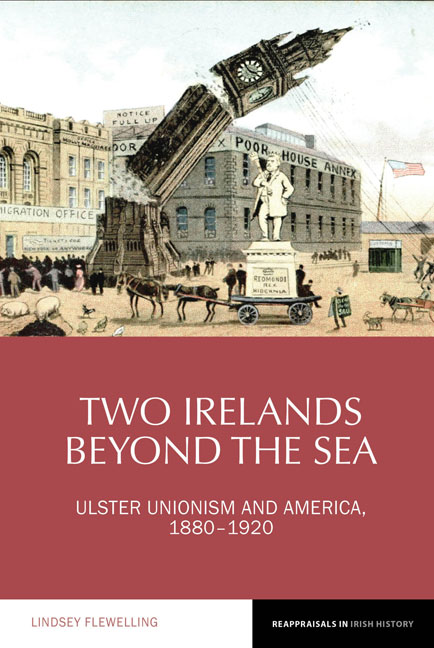Book contents
- Frontmatter
- Contents
- Acknowledgements
- List of Abbreviations
- 1 Introduction
- 2 Ulster Unionists and Irish-American Nationalism in the Late Nineteenth Century
- 3 The Third Home Rule Crisis, the First World War, and Partition
- 4 Scotch-Irish Identity and Attitudes to Home Rule
- 5 Unionist Visits to America
- 6 Transatlantic Religious Connections
- 7 The Idea of America
- 8 Conclusion
- Bibliography
- Index
6 - Transatlantic Religious Connections
- Frontmatter
- Contents
- Acknowledgements
- List of Abbreviations
- 1 Introduction
- 2 Ulster Unionists and Irish-American Nationalism in the Late Nineteenth Century
- 3 The Third Home Rule Crisis, the First World War, and Partition
- 4 Scotch-Irish Identity and Attitudes to Home Rule
- 5 Unionist Visits to America
- 6 Transatlantic Religious Connections
- 7 The Idea of America
- 8 Conclusion
- Bibliography
- Index
Summary
In 1857, Ulster Protestants received reports of significant religious revival in the United States. Eager to spark their own revival, the Irish Presbyterian General Assembly sent two representatives to America to report on the proceedings. Their reports contributed to the beginnings of Ulster's great revival of 1859, which brought American and British influences together with Ulster Scots evangelical religious culture. American revivalists came to Ulster to lead services and prayer meetings, renewing the traditional religious links that had been maintained throughout the eighteenth and nineteenth centuries.
In their Evangelical Protestantism, David Hempton and Myrtle Hill stress the impact of American connections on the Ulster Protestant community. They write, ‘With close links established by successive waves of emigrants, the Ulster Scots community was particularly susceptible to the transmission of religious excitement generated by the American frontier experience’. At the same time the American religious establishment was influenced by Ulster religion. From the colonial period onward, American religion received considerable contributions from Scotch-Irish immigrants as well as other Irish Protestants.
Ulster and America forged connections through centuries of shared religious experiences. A transatlantic Presbyterian tradition was formed by reciprocal flows of clergymen from Ulster to America on the one hand, and, on the other, of revivalists and Princeton-educated ministers from America to Ulster. Religious connections between Ulster and the United States increased throughout the nineteenth century with improvements in communications technology, greater ease of travel for revivalists and missionaries, and the formation of international religious organizations such as the Evangelical and Pan-Presbyterian Alliances.
- Type
- Chapter
- Information
- Two Irelands beyond the SeaUlster Unionism and America, 1880–1920, pp. 168 - 207Publisher: Liverpool University PressPrint publication year: 2018

